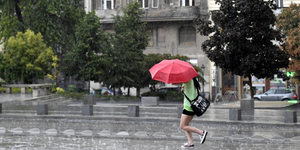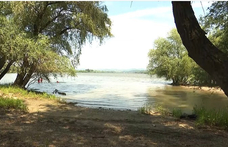Interview with Andras Lanyi, campaigning eco-politician
Andras Lanyi, the environmentalist writer, philosopher and leader of the Living Chain Hungary movement, played an active role in the lead-up to the regime change of 1989. Yet now he believes that the time since has been more like the twilight of the Kadar era than the dawn of a new democracy. "We cannot look on idly as the capital collapses," begins his manifesto, in which he calls for a cross-party push to create a livable city.
The local elections are approaching, and tensions are growing.
I'm afraid that's not what I've seen. I've been collecting signatures for the local elections over the past few weeks, and people regularly shut the door in my face, saying: "We don't even want to see a politician!" It made no difference if I said we weren't politicians, but environmentalists. These people would in principle be open to a radical restructuring of the Hungarian political system, but present conditions maintain people's aversion to politics.
You've talked of the past years as the twilight of the Kadar era.
In a lecture I gave, which was published in the literary magazine Elet es Irodalom, I suggested we regard the past 15 years as the twilight of the Kadar era, and not the dawn of a new Hungarian democracy. I was paraphrasing Huizinga, who talked not of the renaissance but of the twilight of the middle ages. In this twilight era, the Kadarist structures are flexing their muscles one last time. One party became several parties, the nationalisers switched to privatising the nation's wealth - but the gulf dividing society and the political class remained the one we had grown used to over long decades.
It's just the slogan that's changed. "You have freedom of speech, but don't say a word!" People vote for the party that enjoys media support, the media needs vast amounts of money, which is provided via subsidies from major companies. Until we can change this, Hungarian society will continue turning its back on politics. It is the aim of the political elite, or the political class as we call them nowadays, to make sure society is indifferent and leaves the decisions to them.
I don't believe people are as blind as that. You can't blame the media for everything. It is of course true that in some post-communist countries, like in Slovenia or the Baltic states - let's leave Poland and Slovakia to one side - things have gone better than here. How do you explain that?
Today's weaknesses follow from yesterday's strengths. The Kadar regime had unarguable strengths. Before 1989, there was not the kind of crushing mass dissatisfaction that would have justified a radical break with existing structures and the people in power. The late-Kadarist political elite did not for one moment lose their hold on the levers of power. Thus Young Communist secretaries could begin building up capital wealth as soon as the state economy and one-party dictatorship had come to an end.
But the then opposition was unable to stand in the Kadarist elite's way, it fell apart. And the Hungarian Socialist Workers Party's successor carried away the prize. Could it have happened differently?
Yes, if that part of the opposition that we know today as the liberal left had not given in to the idea that the communists would become good capitalists, and that the regime change was no more than a change of mechanism. And if they had not believed that once a market economy was in place and a constitution guaranteed the rule of law on paper, then, with the same power and force relationships and with the same people in charge, democracy could be built in Hungary. These assumptions turned out to be wrong, as we can now see. But another part of the opposition believed that its opponent, the post-Kadarist organisation, was left wing, and thus placed itself on the Right, and got trapped in the process. This happened to Fidesz, the Hungarian Democratic Forum (MDF) and to the Christian Democrats. Their manifestos are left-wing from a social perspective, and they have only a superficial, outdated right-wing side to them. We can now see that this kind of old-style right wing will never win a majority in Hungary.
Yet the Kadarist structures were not left wing. Today's Right has to forget the policies it followed after the regime change and reorganise itself as an opposition. People who believe in a conservative, preservationist political outlook have to accept that the modern form of this is ecological politics. This is far more than environmentalism. People don't have environments, animals do. People are surrounded by culture and language. People have homes and homelands. Modern ecological politics is the same as modern liberalism and conservatism.
So you think we need to move beyond the left-right distinction? That's not going to happen overnight.
I have no illusions. It takes time for a worldview to change. But it is clear that the modern understanding of social justice has collapsed. The market cannot be fair - we need a new approach. Ecological politics provides an answer to the questions of the 21st century: what should we do about globalisation? What are the consequences of global free trade? How do we put an end to the nightmare of information networks? How should we prepare for the day when our reserves of natural resources run out?
Living Chain Hungary is a civil society organisation. It is standing in the local elections as a member of the Budapest Society. It stands for social autonomy, political participation and an economy on a human scale. We don't support expensive and environmentally harmful investments, whether these are programmes of the left or of the right. We support all measures that improve the quality of city life.
Take a concrete example. What's your solution to traffic problems, to Mav's, the state railway's bankruptcy, to congestion in the city?
Let's take a step back. Public services have been orphaned by the government. They think privatisation, the state's rejection of its service obligations, is somehow part of Western-style modernisation. But Western examples do not back this up. The government is building up debt in an irresponsible manner, and then using that an as an excuse to run down its capital wealth. The victims of this policy include hospitals and universities but also railway branch lines and indeed the entire railway network.
This is anything but left-wing, since taking responsibility for the quality of public services is fundamental to solidarity. It should be a fundamental duty of both a social democrat and a conservative to maintain the quality of public services. If a businessman takes money away from a loss-making enterprise, it will go bankrupt. That's exactly what politicians have done in past decades to Hungary's railways. The state has given less money to the network every year, which has led to declining levels of service. You can see the decline everywhere, but they do not even harmonise the timetables of the state-owned bus network Volan and Mav, the railway network. It's as if they were two competing private companies.
Hungary signed the Kyoto Protocol, which obliges us to take steps to reduce vehicle pollution. But we're still building the world's most expensive motorways, for which there is a clear political reason. Every Hungarian party is benefiting from these vast investments, because what is missing from the motorway surface ends up in the parties' bank accounts. The money for developing the motorways is being taken from the railway development budget.
That's the diagnosis, but what are you suggesting?
Freight transport has to move back onto the railways. The major international lines need serious work. It's characteristic that Hungary prefers to improve river navigation on the Danube and the Tisza, building dams and locks, which shows what a strong river lobby we have. Let the railways decline, but bring ocean-going vessels to the lowlands. It's insane!
We need to develop the suburban transport networks to stop the congestion getting worst. One million people come into the city every day, and if they made that journey by suburban train, that service alone would sustain the entire Hungarian railway network. Of course, the network needs to be modernised and extended. Instead we're building a fourth metro in Budapest for HUF400bn, bringing into the centre people who were not even intending to go there.
János Pelle

















